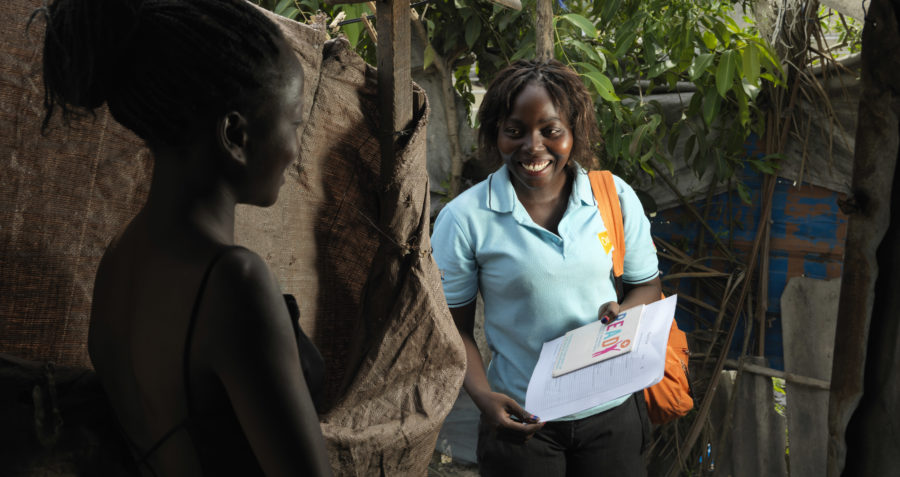Communities hold the key to progress on TB targets, innovation and accountability
 © Frontline AIDS/Peter Caton 2019
© Frontline AIDS/Peter Caton 2019
This week the World Health Assembly (WHA) resumed its virtual session.
Not surprisingly, COVID-19 dominated the agenda this year. However, there were also some key discussions around another critical global epidemic – tuberculosis (TB). The WHA adopted a new global strategy for TB research and innovation.
As TB activists, we welcome these steps and call on the WHO and governments to act on the strategy commitments to accelerate much-needed innovation and accountability on the global TB response.
Communities deliver resilience and service delivery innovations
At the recent 51st Union World Conference on Lung Health, we heard numerous stories of how communities have innovated and adapted service delivery models to sustain TB and HIV services for the most vulnerable people through COVID-19 related lockdowns.
For example, in a number of states in India, TB screening has been expanded to include COVID-19. In Ukraine, TB treatment adherence was ensured and even accelerated by the rapid scale-up of mobile phone video observed treatment, despite COVID-19 lockdowns. These are just a few of the many examples demonstrating communities’ unique added value in establishing person-centered integrated services, driving innovation, and contributing to accelerated progress on TB targets.
We applaud the new strategy’s language on strong coalition-building with civil society organisations and communities. The resolution adopting the new strategy has created a new imperative for WHO, Stop TB Partnership, governments, researchers and other partners to strengthen civil society and affected communities’ leadership and involvement in innovation, research, and accountability, particularly on the national level.
Most of the research in the area of TB is presently biomedical, with very little attention given to engaging people living with and affected by TB. For some time we have called on TB researchers to establish and implement community involvement programmes for research trials. Now we urge WHO and partners and its members to support our calls; and focus more on gender equality and human rights elements of innovation and research implementation.
There is also an urgent need to increase financial resources to support communities and civil society to further develop their technical expertise so that they are able to make meaningful contributions and to shape new treatment regimens and technologies. We know that often local problems have local solutions and need innovations that are led by people living with and affected by TB. We call on donors and partners to ensure grant mechanisms, such as Challenge Facility for Civil Society, prioritise this need.
As the Frontline AIDS partnership we also know that communities are key players, in the creation and the scaling up of innovations, as well as in driving stronger demand for them. In addition, it is communities who lead the way in tackling many of the structural barriers that marginalised people face to TB testing and treatment, often using innovative approaches to do this.
We need donors and governments to recognise the value of communities as innovation laboratories, incubators, and accelerators and invest in giving communities the space to generate ideas, make mistakes and learn from them.
We hope that in implementing the resolution at country level, they will follow these principles and increase financial resources and political space for communities and civil society. Now more than ever before, we need governments to demonstrate political courage and stop policies which criminalise key populations and drive new TB and HIV infections.
The power of multisectoral action and accountability
Another important development is that the resolution adapts WHO’s multisectoral accountability framework to monitor and track progress to end TB. The challenges preventing progress on TB are complex, particularly during COVID-19 times. They can only be addressed via coordinated and decentralised multi-sectoral actions, like multisectoral dialogues facilitated by national Stop TB Partnerships.
In the countries where we work, the multisectoral accountability framework provides an important coordination mechanism to address the biggest challenges, for example reaching the most marginalised people, including sex workers and people who use drugs, with TB treatment and diagnostic services. Using this framework, we will work with partners in our countries to hold our governments to account.
Civil society and WHO governance
The centrality of civil society and communities in decision-making processes is important, particularly during health emergencies like COVID-19, yet in most countries governments have failed to include communities affected by HIV, TB and COVID-19 in national response mechanisms for COVID-19.
Similarly at the WHA this week only World Health Organisation official civil society partners could make statements. Other civil society representatives were unable to play an active part in the discussions. It is more important than ever for the World Health Organisation and World Health Assembly to include civil society and communities at the heart of its governance structures and decision-making processes.
We urge WHO to implement recommendations of the WHO-Civil Society Organisations Task Team to “deepen, systematize, and capitalize on WHO’s partnerships with CSOs.” These include: establishing an ‘Inclusivity Advisory and Oversight Group’ and building in explicit, accessible opportunities for civil society organisations to provide input into WHO policies and governance at all levels.
Check out Frontline AIDS partnership recorded 51st Union World Conference on Lung Health interactive Community Connect discussions to learn more about Frontline AIDS partnership experiences of innovating and adapting TB and HIV co-infection services during COVID-19 lockdowns: English version and and French version.
Tags
AdvocacyTuberculosis (TB)


